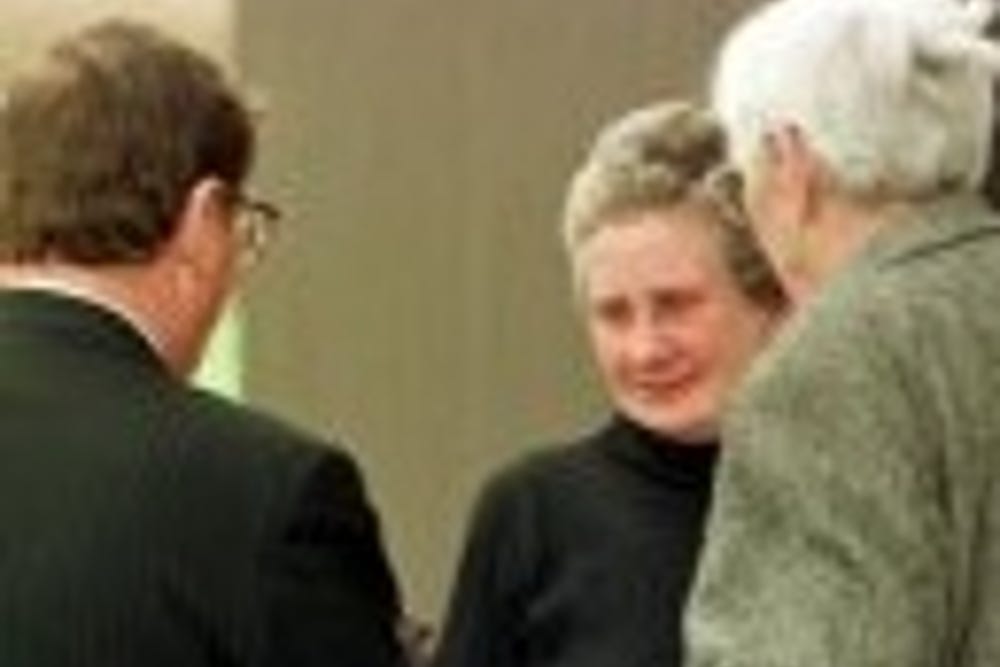Murder of friends across the divide inspired concept of joint First Ministers
Former SDLP leader Mark Durkan said the concept was one of the last additions to the Good Friday Agreement in 1998.

Your support helps us to tell the story
From reproductive rights to climate change to Big Tech, The Independent is on the ground when the story is developing. Whether it's investigating the financials of Elon Musk's pro-Trump PAC or producing our latest documentary, 'The A Word', which shines a light on the American women fighting for reproductive rights, we know how important it is to parse out the facts from the messaging.
At such a critical moment in US history, we need reporters on the ground. Your donation allows us to keep sending journalists to speak to both sides of the story.
The Independent is trusted by Americans across the entire political spectrum. And unlike many other quality news outlets, we choose not to lock Americans out of our reporting and analysis with paywalls. We believe quality journalism should be available to everyone, paid for by those who can afford it.
Your support makes all the difference.The murder of two best friends inspired the original concept of a joint office of the First and deputy First Minister in Northern Ireland.
Damien Trainor and Philip Allen were killed by the LVF in a bar in Poyntzpass, Co Down, just weeks before the Belfast/Good Friday Agreement was signed.
The murder of the friends, one of whom was Catholic and the other Protestant, saw then UUP leader David Trimble and SDLP deputy leader Seamus Mallon take a break from the political talks for a powerful display of unity.
SDLP negotiator Mark Durkan told the PA news agency that their friendship inspired him to propose a joint First and deputy First Minister for the new Assembly.
However he said the original concept, where the Assembly voted in the First and deputy First Ministers, was changed in the St Andrew’s Agreement in 2006 to allow the largest party to nominate a First Minister, and second largest to nominate a deputy First Minister, without an Assembly vote.
This has seen periods of paralysis, from 2017-2020 when Sinn Fein refused to nominate a deputy First Minister, and more recently when the DUP refused to nominate.
Looking back to 1998, Mr Durkan said Mr Mallon told him that it was important that the talks were seen to be going on so “political dialogue was seen to have primacy over violence”.
“I can remember round the talks table that morning, it was the period that Sinn Fein had been expelled so they weren’t there, but there was a united determination that the sort of violence that had been carried out by the LVF was not going to win out,” he said.
“I said that the stories we were hearing about Philip and Damien’s friendship could be a parable for the type of society we might create if we could reach an agreement, and that it would take our parties, plus Sinn Fein when they returned, to reach an agreement and give the people the final say – not the LVF or any other paramilitary group.
“We went on to argue about our different models of government, but maybe there was less rhetoric in the argument that day, more practicality.”
Mr Durkan said later that day he saw television footage of Mr Trimble and Mr Mallon together in Poyntzpass.
He said watching a leader of unionism and a leader of nationalism “binding the wounds of the community” inspired his idea of a joint office of First Ministers.
“We didn’t like the idea of a hierarchy of designations, but because we were faced with a number of criticisms of our proposals, and we hadn’t worked out exactly how to appoint the First Minister and whether is there a second minister, the pictures from Poyntzpass created this idea of a joint office,” he said.
“David Trimble had the idea put in front of him, and it was only two weeks out from the Good Friday Agreement, he was very clear, he was possibly on for the joint office, but it had to be different titles, so the insistence was, one would be First, the other deputy First, but the substantive point was the powers would be joint and equal.”
Mr Durkan said he would like to see the original concept revisited.
“In the original Good Friday Agreement the joint First Ministers were elected by the Assembly, that people would have to be jointly nominated and jointly elected by the Assembly, and the Good Friday Agreement didn’t specify that one had to be from one designation or they had to be from different parties,” he said.
“At St Andrews the rules were changed so that instead of First Ministers being jointly elected, an algorithm was introduced, or what I would call a tribalgorithm, that said one party would exclusively have the right to nominate a First Minister, and another party according to the number of seats etc would have the right to nominate the deputy First Minister – nobody else would have the right to nominate and no joint vote by the Assembly.
“Some of us did warn Tony Blair and Bertie Ahern at St Andrews that this was going to further tribalise Assembly elections, and it was going to create powers that could be turned into vetoes.
“The situation we have had for the past year where the DUP have refused deputy First Minister has kept the Assembly in abeyance, that goes back to changes that were made at St Andrews.
“My belief is we should go back to something more like what was in the original Good Friday Agreement, and have the Assembly jointly elect First Ministers.”